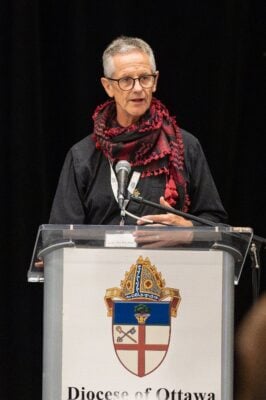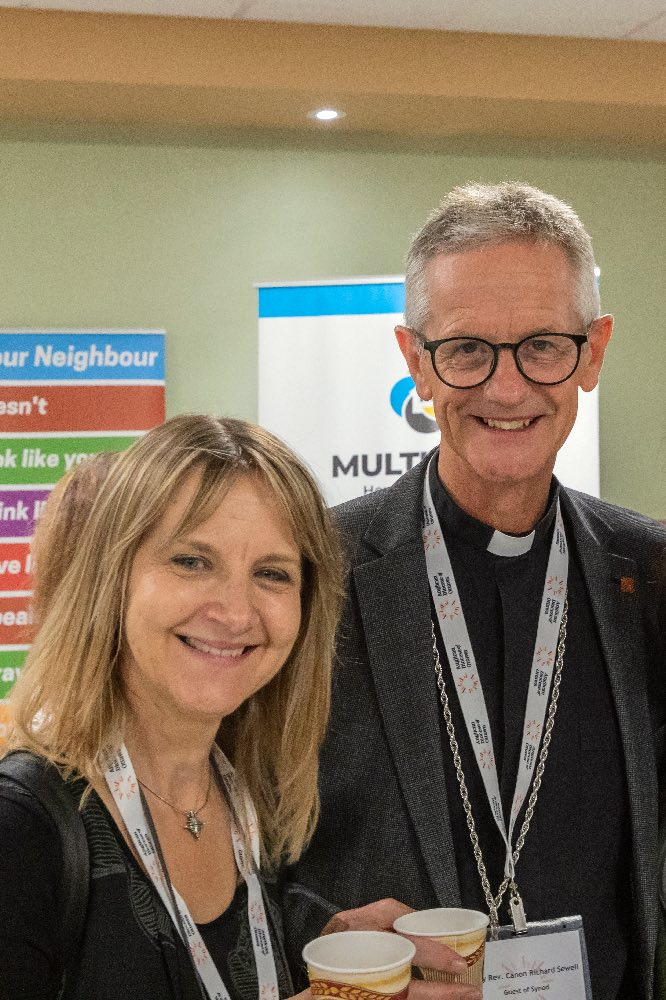The guest speaker for Synod was the Very Rev. Canon Richard Sewell, who has served for five years as the Dean of St George’s College, which is the Anglican centre for pilgrimage in the Holy Land. Dean Sewell is also Residentiary Canon of St George’s Cathedral, Jerusalem. He and his wife JulieAnn arrived in Canada just as the war in Israel and Gaza had been raging for two weeks. Context is vital in this complex conflict, so Crosstalk is sharing the full text of his nuanced and Christian reflection, which followed after he read a letter from Archbishop Hosam Naoum, Archbishop of Jerusalem and the Middle East.
There is a contemporary cliché: “we are where we are.” It conveys something important when it hasn’t been overused to meaninglessness. It is, that we cannot change what happened previously, in other words, history, and we simply have to face the reality of the present moment. But in many cases, and certainly in the situation in Israel/Palestine, we do have to understand what has gone before in order to seek to chart wise steps forward. But, let’s ask where are we today?
We are in a state of war between Israel and Gaza. Israel suffered its worst single atrocity since the founding of the State of Israel at the hands of Hamas. Both the numbers, and the manner of the killings, is deeply distressing. It seems that approximately 200 people, men, women and children have been taken hostage and remain a bargaining tool for Hamas in their bitter zero sum war with Israel.
These actions must be unreservedly condemned. Hamas has proved that it is the terrorist organization which it has been long labelled. In addition, Hamas has launched thousands of missiles from Gaza.
[The missiles have been launched] into all parts of southern and central Israel and also Jerusalem, including where St George’s College, the Cathedral and Diocesan offices are situated.
It is where JulieAnn and I live. We have heard the sirens, we have heard thuds of missiles landing within a mile of our location, we have taken refuge in our bomb shelter on several occasions. I do not like being bombed by Hamas. Israelis who live nearer to Gaza are terrified by the even more frequent bombing. Israel has suffered huge fatalities and casualties, and it has been taken into a new level of individual and corporate trauma.
The day after this onslaught began, Israel declared war on Hamas and unleashed a huge aerial assault on Gaza and its two million residents. I respect the right of Israel to defend itself. The way in which that response is conducted matters hugely. The Israeli action comprises a massive bombing barrage of the whole Gaza Strip including on civilian areas, hospitals and places of worship. I do not think this is acceptable (despite Israel’s justifications). The forced evacuation of one million Gazans from the north of the Strip to the south, in my view, is not acceptable. The siege of Gaza, cutting off water and power and all incoming aid, is not acceptable. Breaches of the laws of war, established in international agreements, should be condemned, whoever commits them and wherever they are enacted.
Both Hamas and Israel are putting civilians at risk. Throwing bombs around indiscriminately will inevitably lead to huge numbers of civilian deaths. Both sides are treating civilians as collateral damage.
We have had our own horrific experience with this week’s appalling bombing of the grounds of our Al Ahli hospital in Gaza city. The precise nature of that attack and who is responsible continues to be a matter of dispute. But what cannot be disputed is that at least 471 people have died, and many others injured whilst sheltering in the grounds of our hospital. A place where they thought, and everyone should agree, ought to be safe. It is a devastating event which I suspect will shape the mission of our diocese for decades to come. We will never forget this event of Oct. 17, we will never forget the people who have died and the assault on our holy ministry to tend to the sick, to heal the diseased and to bind up the injured. It is, in the words of Archbishop Hosam [Naoum], a ‘crime against humanity’. We do not know yet for certain who is responsible, but it doesn’t diminish the nature of the crime. It has let us all deeply shocked and profoundly saddened.
But it is not the only war crime of the past two weeks, and I fear it will not be the last in this appalling war. Israel’s continuing onslaught of Gaza and what will yet unfold is out of all proportion, and the stated aim of destroying Hamas is fundamentally damaging to the prospect of peace in Israel/Palestine and is a very real threat to the security of the entire region because that aim is killing so many non-Hamas people. We stand on the brink of an abyss. The international community has to remain involved and get more involved to prevent the apocalyptic possibilities which stand before us.
We are where we are, yes. But we also have to thoroughly interrogate the question: how did we get here? If we just treat Hamas’s outrage on Oct. 7 as an ‘unprovoked attack’, we will fail to grapple in any reasonable way with the challenge of the present moment. I’m not going to try to describe the terrible and complex history of the past 75 years. It’s all written, but don’t take only one account, perhaps more than any other current geo-political situation, you need to read from different perspectives.
Just in terms of Gaza, it has been blockaded by Israel for the past 18 years. Of course, they have their justifications for that, but regardless, the impact has been to make Gaza an incubator for hatred. Hamas has grown and thrived in the conditions which Israel has imposed upon two million Gazans. There have been intolerable conditions, creating untold suffering and deep resentment for years. Whilst the explosion of violence on Oct. 7th may have been unpredicted, it has been entirely predictable that it would explode at some point.
And then, do not forget to look at the differently awful conditions in the West Bank and the gradual crushing of hope for them that there are any possible non-violent paths towards a situation which will be tolerable for two million Palestinians living there. It is under reported because of Gaza, but the situation is rapidly deteriorating too.

We are in pain, we are in terrible pain. Every single Israeli Jew, every single Palestinian, Christian and Muslim, is grieving, is frightened and is angry (in some way or another, expressed differently). The suffering Olympics is futile. There is no point in pitting one community’s pain and trauma against another. Both are aggrieved to the core of their being, and no one knows how to alleviate it right now.
But we are Christians. We are called to follow the way of Christ. We are called to turn the other cheek, to love our enemies and to pray for those who persecute us. We are called to reject the dreadful and addictive cycle of tit for tat violence. To take the well-known phrase of Gazan doctor, Izzeldein Abuleish whose home was hit by an Israeli missile in 2009 instantly killing three of his daughters and a niece. His powerful book of resistance to the usual narrative was entitled, I Shall Not Hate. I commend it to you. As Christians, we can identify Muslim Dr. Abuleish’s message as profoundly Christian, following the spirit of Jesus’s teaching.
As the Church we are called to be the fragrance of Christ when all around reeks of hatred and revenge. As the Church, we are called to be a light in the world even as encroaching darkness threatens to overwhelm us. But the 1% of Christians in Israel and Palestinians cannot do this alone. They need the global Christian community to amplify this message.
The message of peace entrusted to us by the Prince of Peace is not simply an avoidance of conflict and a call to endure the oppression which is put upon the weak by the strong. Reverting back to the prevailing crushing injustice before two weeks ago is not acceptable. It is no more Christian than to take up arms and to kill the oppressor. Gandhi, the great nonviolent proponent said the only thing worse than committing a violent act of liberation is to do nothing in the face of evil.
For too long the West has done nothing and has allowed the crushing reality of aggressive and expansionist policies of the state of Israel to go unchallenged, or at least unchallenged in any way that would make any impact on Israel’s leaders. That is the fundamental root cause, not the only one by any means at all, but it is at its heart, for the present hideous conflagration which we face. I do not believe it is anti-Semitic to say such a thing. I have been a life-long anti-racist proponent and at times activist. I have always spoken against anti-Jewish racism. It remains essential to my self-understanding. I deplore the upsurge of racist attacks against Jews and Muslims here in Canada and in many other countries in these past weeks. I also deplore and oppose the increase in anti-Christian acts in Israel over recent years. But we cannot avoid stating criticism of countries for fear of being labelled. We have to have the courage to identify acts of hatred, discrimination and oppression where we see them: at home or elsewhere (as long as we have taken the time to understand the situation that we condemn). All of this should be in our DNA as Christians. We need to work without ceasing to bring the land we call holy from the edge of darkness and we all have our part to play.
However, when Bishop Shane first invited me to come to attend this synod several months ago, all of this was not the reason for the visit, nor would it have been the core of my message. The heart of my message would have been to commend to you the ministry of St George’s College. I would have invited you to come and make your pilgrimage with us. I would have said – ‘come and walk in the footsteps of Jesus and meet the living stones of his church today in Israel and Palestine’. That I cannot say that, and in all honesty today, to invite you to make your booking as an individual or a church with a plan to come in the months to come, grieves me very deeply. The College is closed for now. I pray that we will be able tentatively to resume pilgrimages from January, but I simply do not know.
We came through two years of COVID and survived and now this. But because you cannot come on pilgrimage does not mean that you should forget us: the College or the rest of the Diocese. We are one body, made up of many different parts. Please do not neglect us, and please do not feel that it is too difficult, too complex and too stressful to engage with our reality – we need you, and I believe, you need us.
It is going to be a long hard road towards justice, peace and reconciliation from here. It will begin by building bridges of understanding and those bridges cannot be built out of hatred. So let us not add our own words, from which point of view, add to the hate that already prevails in abundance. Let Christ be our way, our truth and our life, drawing us together in unity so that the world may know that we are the disciples of Jesus Christ, the Prince of Peace and the inaugurator of God’s commonwealth of justice, joy and peace. Lord have mercy. Amen.
Read more about it
For those who want to understand more about the Israeli-Palestinian conflict, Dean Richard Sewell offered a list of recommended reading:
History
- The Hundred Years War on Palestine by Khalid Hussein
- Jerusalem – A Biography by Simon Sebag Montefiore
- Israel-Palestine Conflict 1917 to 2017 by Ian Black
Non-fiction
- Apeirogon by Colom McCann
- The Nine Quarters of Jerusalem
- I Shall Not Hate by Izeldein Abuleish
Non-fiction in the style of fiction
- Blood Brothers by Elias Chacour
- A Tale of Love and Darkness by Amos Oz
- The Lemon Tree by Sandy Tolan
Fiction
- Mornings in Jenin by Susan Abulwehah


Saint Mary’s Church, Westmeath — Deanery of the Northwest